Supplementing with one of the best protein powders is often integral to those hoping to pack on muscle mass during a bulking phase. Of course, not just any protein powder will do. With such fitness goals, you’ll need a supp that’s low in sugar but high in calories (and, of course, protein), as each of those calories has to count.
You may ask how you’re going to find the time between work and your regimented exercise routine to research the deluge of protein powders on the market. Lucky for you, BarBend’s team of trainers, lifters, and fitness fanatics have tested hundreds of supps to find the best protein powders for weight gain. Read on for our picks.
The 9 Best Protein Powders for Weight Gain of 2026
- Best Protein Powder for Weight Gain Overall: Transparent Labs Mass Gainer
- Best Casein Protein Powder for Weight Gain: Legion Casein+
- Best-Tasting Protein Powder for Weight Gain: Crazy Nutrition Mass Gainer
- Best Natural Protein Powder for Weight Gain: Naked Nutrition Naked Mass
- Best High-Calorie Protein Powder for Weight Gain: Dymatize Super Mass Gainer
- Best Protein Powder for Weight Gain for Athletes: Optimum Nutrition Serious Mass Mass Gainer
- Best Budget Protein Powder for Weight Gain: Muscle Milk Genuine Protein Powder
- Best Meal Replacement Protein Powder for Weight Gain: Bare Performance Nutrition Strong Food
- Best Vegan Protein Powder for Weight Gain: Iron Vegan Athlete’s Gainer
Editor’s note: The content on BarBend is meant to be informative in nature, but it should not be taken as medical advice. The opinions and articles on this site are not intended for use as diagnosis, prevention, and/or treatment of health problems. It’s always a good idea to talk to your doctor before beginning a new fitness, nutritional, and/or supplement routine. Individual needs for vitamins and minerals will vary.
How We Tested and Chose the Best Protein Powders for Weight Gain
The BarBend team is made up of certified personal trainers, weightlifting coaches, and competitive athletes. To determine the best protein powders for weight gain available today, we’ve tested nearly 100 different profiles from the industry’s best brands, utilizing the BarBend Supplement Testing Methodology to rate each profile on a scale of 1 (lowest) to 5 (highest). Below are some of the categories and components that played into our rankings.
Calorie and Protein Content
The major factor that separates your run-of-the-mill protein powder from a protein powder for weight gain is the calorie content. “Gaining muscle comes down to protein plus calories plus progressive overload,” said biochemist Trever Kashey, Ph.D. when discussing mass gainer pros and cons with BarBend.
Since it’s likely you’ll be working hard in the gym, additional calories are necessary to help you put on mass, rather than lose it. Research suggests that 300 to 500 calories or more daily on top of basic calorie needs is ideal for muscle growth — or hypertrophy. (1)(2) Studies also show that calorie surpluses within this range are most ideal for muscle weight gain without gaining too much fat during the bulking process. (3)
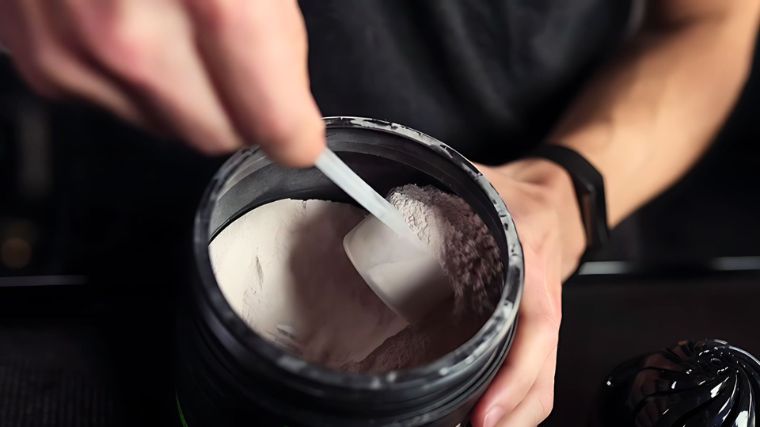
We sought to include supplements with higher-than-usual calorie ranges. Many protein powders contain between 100 and 200 calories per serving, but our picks have a much wider range, with standard protein powders delivering between 100 and 300 calories per serving and mass gainers and meal replacements spanning roughly 450 to 1,300 calories per serving.
Further studies show that those over the age of 65 years old consuming between 1.2 to 1.59 grams of protein per kilogram of body weight and adults less than 65 years of age consuming greater than 1.6 grams of protein per kilogram of body weight had the most significant lean muscle mass when undergoing resistance exercise. (4)
As such, our picks include more grams of protein than traditional protein powders, which tend to supply between 15 and 25 grams per serving. To support bulking goals, many of our picks have between 40 and 55 grams of protein per serving. And since research shows that around 3 grams of leucine, a branched-chain amino acid, for every 25 grams of whey protein can help sustain muscle synthesis for up to five hours, we prioritized products with a strong BCAA profile. (5)(6)
We also looked for powders that also include creatine, which research has shown can help increase energy stores for better muscular contractions, not to mention support recovery between workouts. (7)
If you’re interested in learning more about some of the best mass gainers we’ve tested, check out the below video with BarBend’s Jake Herod, NASM-CNC.
Finally, it’s important to note that protein powders and mass gainers are not meant to replace whole foods in your diet, but rather to simplify the process of increasing your calorie intake. “The best way to gain muscle is to eat a well-balanced diet that consists of fruits and vegetables, whole grains, protein, and healthy fats,” Natalie Rizzo, a registered dietitian, told BarBend. “Choose high-quality protein, like poultry, fish, soy, beans, and legumes.”
Third-Party Testing
For any dietary supplement, we look at third-party testing. This means that the product has been tested by a third party to ensure that what’s on the label is what you’ll actually get in each scoop. Third-party testing provides the consumer assurance that the product is safe and pure.
Third-party testing may come from an independent lab. In other cases, third-party testing may be done by certification companies like the National Sanitation Foundation (NSF) or Good Manufacturing Practices (GMP). Other certificates you can trust include Informed Choice, which tests for banned substances for athletes, among other compounds.
We prioritized protein powders and mass gainers with evidence of third-party testing. If a product hasn’t been tested, but is still on our list, that’s because the brand has a solid reputation that has earned our trust.
Whenever possible, BarBend conducted its own independent testing to determine a product’s presence of heavy metals, bisphenols, phthalates, and pesticides. When we had results to share, we included them below.
Price
For the effects of any supplement to show, you’ll need to commit to it for a period of time. As such, you want a product that fits into your budget. When making our list, we looked at not only the total price of a protein powder container, but the price per serving of each protein powder.
The pricier products on our list tend to have third-party testing and added compounds like BCAAs and creatine. When making our list, though, we looked for brands with subscribe and save options that can help lower the cost of a given product.
Best Protein Powder for Weight Gain Overall: Transparent Labs Mass Gainer
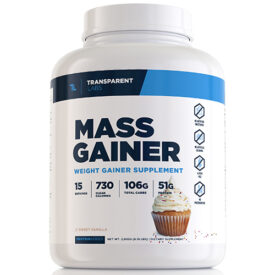
High on protein, low on fat, and containing no artificial ingredients, this clean mass gainer should sit well in almost anyone's stomach. Your most challenging choice is whether you want Sweet Vanilla or Chocolate Glaze Donut.
Specs
- Price Per Serving: $5.33
- Protein Source: Grass-fed whey protein concentrate
- Protein Per Serving: 53g
- Calories Per Serving: 750
- Third-Party Testing: Yes (Informed Choice)
- Available Flavors: Chocolate Glaze Donut, Sweet Vanilla
Pros
- Huge doses of protein, calories, and carbs for those in a bulking phase
- Includes 3 grams of creatine monohydrate to aid with muscle growth
- Gluten-free and non-GMO
Cons
- Each serving has 590 milligrams of sodium and 12 grams of saturated fat — not ideal for those concerned about heart health
- Pricey at over $5 per serving
- Some consumers complain of the aftertaste of the vanilla flavor
Transparent Labs Mass Gainer is our pick for the best protein powder for weight gain overall. At 750 calories and 53 grams of protein per serving, this product is an ideal meal replacement or potent post-workout protein shake. We also like the 3 grams of creatine monohydrate per serving, as creatine, one of the most-studied supplements on the market, has been shown to help increase muscle strength, muscle mass, and athletic performance. (8) Our testers scored the formulation a 4.25 out of 5.
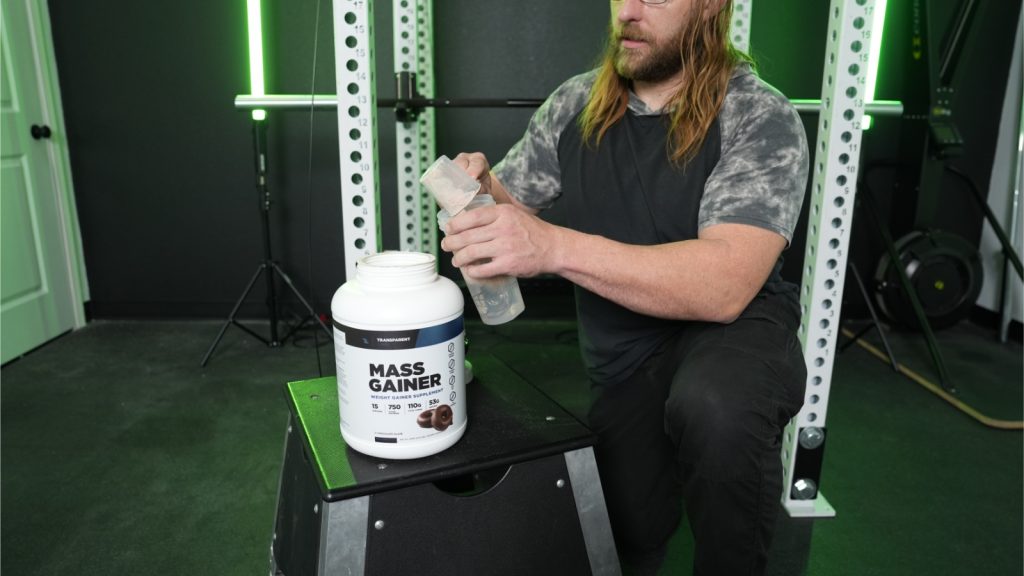
This protein powder is non-GMO, gluten-free, and free from preservatives. It also contains just 12 grams of sugar per serving, which is fairly low for the calorie content you’re receiving.
The downsides of Transparent Labs Mass Gainer are the saturated fat and sodium content, as well as the price. “Two things give me pause with Transparent Labs Mass Gainer — its sodium and saturated fat contents,” says BarBend expert reviewer Chelsea Rae Bourgeois. “Each serving provides 590 milligrams of sodium and 12 grams of saturated fat. There’s a lot to unpack there, but to keep it short, if heart health is a concern, you should be mindful of how frequently you use this powder.”
It also costs roughly $5 per serving, which is well above the $1 to $2 average you tend to see with the average protein powder. That said, you’re going to pack on a lot more mass with this product than a standard whey protein powder, so our testers found the price justifiable, scoring it a 4 out of 5.
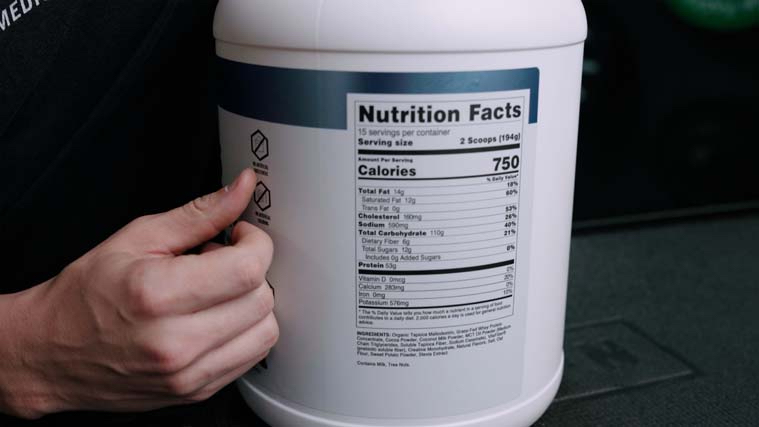
As far as taste, some customer reviews take issue with the aftertaste of the Sweet Vanilla flavor. Our testers sampled the Chocolate Glaze Donut and had no issues with the taste or solubility, with both scoring a 5 out of 5. Finally, we also like the addition of MCT oil, as it helps aid with absorption and works to provide gut support. (9)
Read the full Transparent Labs Mass Gainer Review.
Best Casein Protein Powder for Weight Gain: Legion Casein+
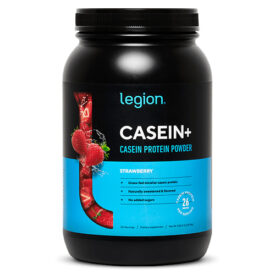
Legion's Casein+ has more protein per calorie than any other casein we've seen, plus it has no artificial ingredients. Each serving provides 5.2 grams of branch chain amino acids.
Specs
- Price Per Serving: $1.79
- Protein Source: Pure micellar casein protein
- Protein Per Serving: 24-26g
- Calories Per Serving: 110-140
- Third-Party Testing: Yes
- Available Flavors: Dutch Chocolate, Cinnamon Cereal, Strawberry, French Vanilla
Pros
- Contains casein made from the milk of hormone- and antibiotic-free cows
- Low-sugar formula suited for low-carb diets
- Gluten-free
Cons
- Low in calories compared to other protein powders
- Our tester experienced a “chalky” aftertaste
- Thicker texture can be tough to mix
Casein protein digests slower than whey protein, meaning you may feel fuller for longer after a dose. (10) Legion Casein+ is one of the best casein proteins we’ve tested because it pairs an above-average dose of 24 to 26 grams of protein per serving with 11.4 grams of muscle-boosting essential amino acids. It’s also made from naturally-sourced ingredients, including dairy sourced from hormone- and antibiotic-free Irish cows, and was tested by third-party labs. We scored the formulation a 4.5 out of 5.
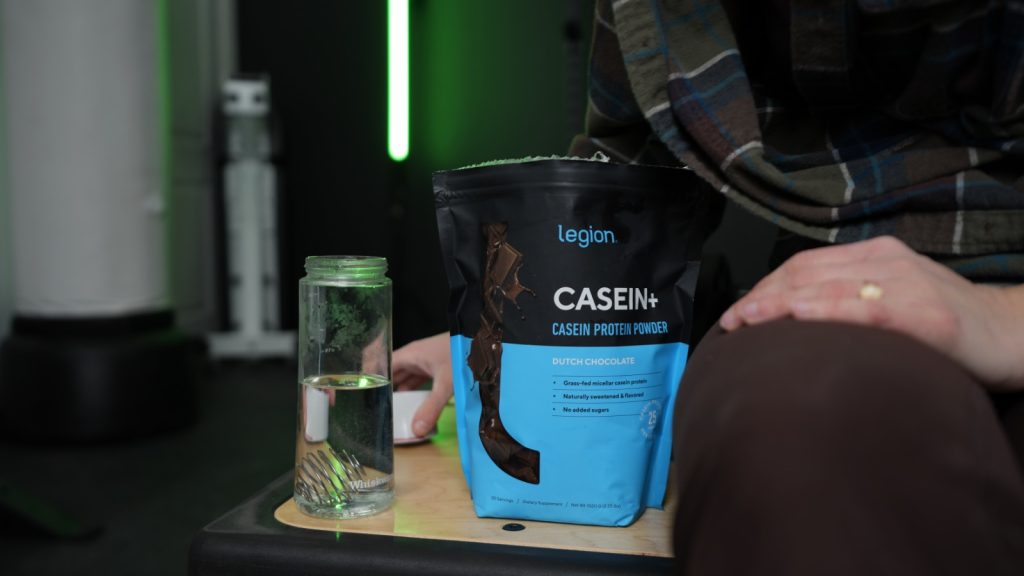
It is fairly low in calories at 110 to 140 calories per serving, so those looking to pack on pounds may benefit from blending it with milk, yogurt, or healthy fats like nut butter to boost its calorie content. The upside of this low calorie content is that it is also very low in sugar at only 2 net carbohydrates and 1 gram of added sugar per serving. This low sugar content would make it an ideal option for a low-carb lifestyle.
Based on our own testing, we graded Casein+ at a C overall for purity. This protein sample scored in the top 50 percent among all sampled powders for heavy metals, and the top 10 percent for the presence of bisphenols, phthalates, and pesticides.

Our tester utilized this product as a meal replacement and found it satisfying. They mixed the Dutch Chocolate flavor with water, noting that it mixed decently but separated from the water after being left unattended for 20 minutes. Casein is naturally much thicker than whey proteins, so you’ll want to use a blender (or shake really hard) when mixing this one.
“It reminds me of a dark chocolate that is not too rich or too sweet,” said our tester. “The texture with water is a normal thickness, but the aftertaste is very chalky. It lines your mouth with a dry, chalky texture.” Taste scored a 4 out of 5, while solubility got a 3.5 out of 5.
If you want to offset that chalkiness, we’d recommend mixing it with milk and yogurt. Some customers have also complained about the aftertaste of the monk fruit sweetener in this powder, so that’s also worth taking into consideration.
Read the full Legion Casein+ Review.
Best-Tasting Protein Powder for Weight Gain: Crazy Nutrition Mass Gainer
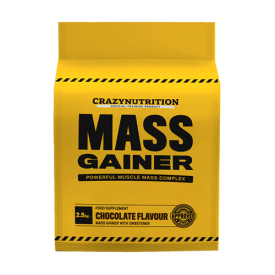
This mass gainer is packed with calories and is among the best-tasting mass gainer products we've tried. You can get it in chocolate or vanilla flavors.
Specs
- Price Per Serving: $4.49
- Protein Source: Whey protein blend
- Protein Per Serving: 40g
- Calories Per Serving: 488
- Third-Party Testing: No
- Available Flavors: Chocolate, Vanilla
Pros
- Our tester found the Vanilla flavor “pleasurable and satisfying”
- Includes B vitamins, zinc, and magnesium
- Added Digezyme to help ease digestion
Cons
- Contains fewer calories and carbs than comparably-priced mass gainers
- Does not mix well in blender bottle
- Not suited for those with a lactose intolerance
Crazy Nutrition Mass Gainer is one of the best-tasting protein powders we’ve tried. It’s only available in Chocolate and Vanilla, but the classics are classics for a reason. Our tester, a certified personal trainer and weightlifting coach, found the Vanilla flavor of this mass gainer to have a “pleasurable and satisfying taste” that, unlike other vanilla-flavored protein powders, captured its sweetness and creaminess when blended with water or milk. They scored it a 4 out of 5 for taste.
“It’s only available in Chocolate and Vanilla, but they do those traditional flavors very well,” says BarBend expert reviewer Chelsea Rae Bourgeois.
Each serving contains roughly 500 calories, 40 grams of protein, and 55 grams of carbs, which our testers found a touch low for the $4.49 per serving price. That said, they thought it would be a good fit for smaller athletes who don’t need more than 700 or 800 calories in a shake. Formulation scored a 3 out of 5.
“It’s a little bit higher in fat content, which is where that rich, creamy flavor is coming from,” adds Bourgeois. “The fat source comes from MCT oil, which we know can offer a lot of really good health benefits.” (11)
We do, however, like its incorporation of vitamins B6 and B12 for an energy boost, as well as the zinc and magnesium for immune health support. Its low sugar count — just 8.45 grams per serving — helps, too.
That oat flour, however, can settle at the bottom in a blender bottle, so we’d recommend using an actual blender for this one. As such, we scored its solubility a 2 out of 5.
If whey protein tends to upset your stomach, Crazy Nutrition works to offset that with DigeZyme, a blend of five enzymes that may help improve absorption and ease any digestive discomfort. (12) That said, it’s worth noting that one of our testers with a lactose intolerance did experience some “stomach bubbles” afterwards, though another tester with no intolerance felt fine.
Best Natural Protein Powder for Weight Gain: Naked Nutrition Naked Mass
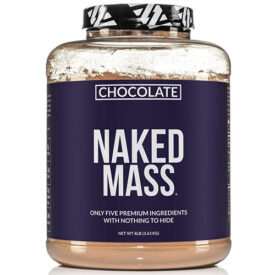
Naked Nutrition's whey is grass-fed and it’s made without acids, heat, bleach, or growth hormone. Other ingredients include organic tapioca maltodextrin, whey protein concentrate, micellar casein, organic coconut sugar, and organic cacao powder.
Specs
- Price Per Serving: Starting at $5.90
- Protein Source: Whey and casein blend or brown rice and pea blend
- Protein Per Serving: 50g
- Calories Per Serving: 1230-1360
- Third-Party Testing: Yes (Informed Choice)
- Available Flavors: Chocolate, Vanilla, Strawberry, Chocolate Peanut Butter, Double Chocolate, Unflavored
Pros
- Trim ingredient lists with no artificial flavors, soy, gluten, or GMOs
- Choose from grass-fed whey or plant-based protein sources
- Third-party certified by Informed Choice
Cons
- Very high in carbs at around 250 grams per serving
- Certain flavors are high in saturated fat
- Didn’t taste great with water or milk — best in a smoothie
Naked Nutrition Naked Mass is a super high-calorie protein powder for weight gain. At 1,230 to 1,360 calories per four-scoop serving — depending on flavor and formula — this product is for those looking for fast bulking support from a product that’s free from artificial additives. Whether you go for Naked’s whey protein blend or vegan protein blend, the formula will contain no soy, gluten, GMOs, or artificial sweeteners. The purity of its trim ingredients lists have been certified by Informed Sport, a third-party testing agency.
In addition to its high calorie count, each serving of this mass gainer includes 50 grams of protein, around 250 grams of carbs, and impressive doses of iron and calcium, though those will differ based on your desired flavor and formulation.
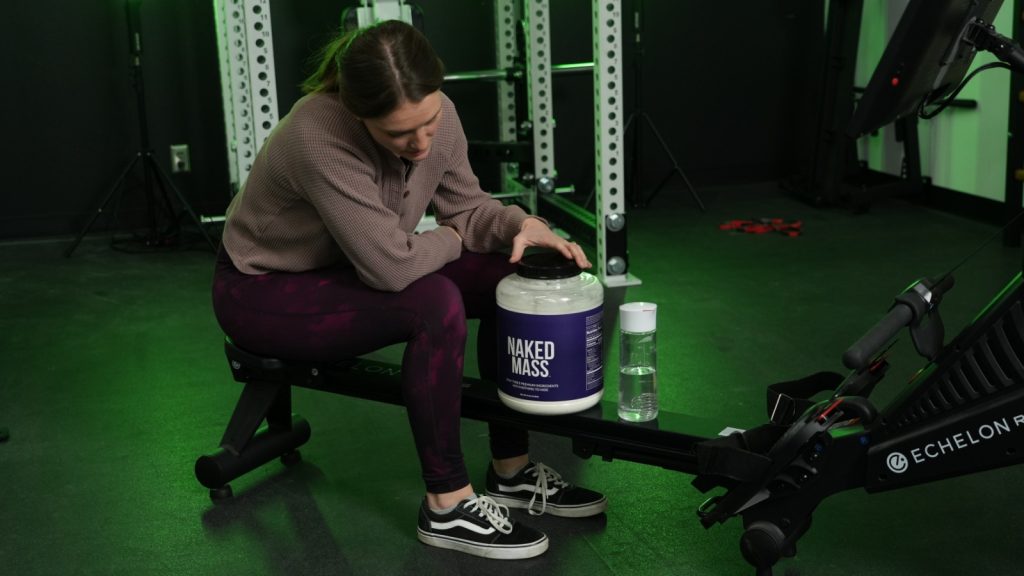
It should go without saying this is not one of the best low-carb protein powders. “Naked Mass provides around 250 grams of carbs per serving, which is a pretty hefty amount of carbs for one sitting. Definitely meant for a specific customer base,” says BarBend expert reviewer Chelsea Rae Bourgeois. “I do like that they kept the sodium content low in some flavors of their mass gainer formula, and I’m a fan of the short ingredient lists.”
Bourgeois scored its formulation a 4 out of 5, but noted that some of the available flavors are “super high in saturated fat and sodium.” She added, “You definitely need to be mindful of your overall diet when including such a nutrient-dense dietary supplement in your routine.”
Our tester, a USA Weightlifting Level-2 coach, wasn’t impressed by the taste or solubility of this mass gainer when mixed with water or milk, scoring each category a 2 out of 5. However, when mixed with a smoothie — in their case, 12 ounces of milk, peanut butter, cocoa powder, and half a banana — those scores jumped up to a 4 out of 5 for taste and a 5 out of 5 for solubility. “Mix it in a smoothie and you’re off to the races,” they said. “I didn’t experience any protein aftertaste.”
Best High-Calorie Protein Powder for Weight Gain: Dymatize Super Mass Gainer
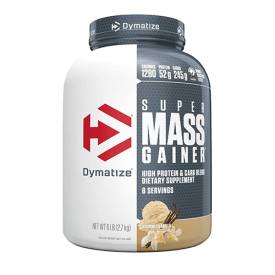
Dymatize Super Mass keeps calories high, packing plenty of carbs and protein per serving. This is also a budget-friendly option for those who can't spend a ton on their supplements.
Specs
- Price Per Serving: Starting at $4.75
- Protein Source: Whey and casein protein blend
- Protein Per Serving: 52g
- Calories Per Serving: 1,280
- Third-Party Testing: Yes (Informed Choice)
- Available Flavors: Rich Chocolate, Vanilla
Pros
- Calorie-dense at 1,280 calories per serving
- Has 52 grams of protein per serving with 10.7 grams of BCAAs
- Packed with vitamins, calcium, magnesium, and other nutrients
Cons
- Only eight servings per container
- Very thin when mixed with water or milk
- You’ll want to use a blender when mixing
If you’re looking to bulk up fast, Dymatize Super Mass Gainer might just become your best pal. Each serving of this high-calorie whey protein powder contains 1,280 calories, 52 grams of a whey and casein protein blend, and 245 grams of carbs. Since most people only require 300 to 500 calories per serving to help support muscle hypertrophy, we’d recommend this one primarily for bodybuilders. (1) (If you’re unsure about whether you need this many calories, add your stats into this calorie calculator.) Our testers scored the formulation a 3.5 out of 5.
We like that each serving contains 10.7 grams of BCAAs, including 5.1 grams of leucine, which has been shown to help sustain muscle synthesis. (5)(6) It also contains 25% or more of the daily recommended value of seven vitamins and minerals, along with smaller servings of ten others. And our testers report no side effects or bloating after consuming this product.
“I dug the Rich Chocolate flavor. Not too sweet and definitely tickled my sweet tooth,” said our tester, giving it a 4.8 out of a 5 for taste. That said, they found it thin with milk and even worse in water, finding it most palatable as part of a smoothie.
They also found it lumpy when mixed in anything aside from a blender. “In a blender, I give a 4 out of 5 for solubility, but in a shaker cup I’d knock it a point — 3 out of 5,” they said.
At $4.75 per serving, it’s reasonably priced for a mass gainer, but each tub only contains around eight servings. If you plan on taking this for a prolonged period of time, you’ll need to re-up on a consistent basis, and those costs can add up. As such, we only scored its value a 3 out of 5.
Best Protein Powder for Weight Gain for Athletes: Optimum Nutrition Serious Mass
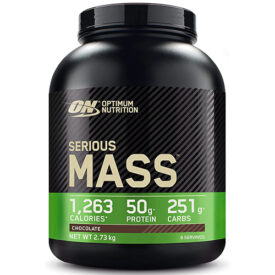
This mass gainer contains 1,250 calories per serving, 100 percent of the recommended daily intake of most vitamins and minerals, and 50 percent of your daily vitamin D, which is important for testosterone.
Specs
- Price Per Serving: $6.50
- Protein Source: Whey protein concentrate
- Protein Per Serving: 50g
- Calories Per Serving: 1,260
- Third-Party Testing: Yes (Informed Choice)
- Available Flavors: Chocolate, Chocolate Peanut Butter, Strawberry
Pros
- Contains creatine and glutamine, both shown to support athletic performance
- Contains loads of nutrients, including iron, calcium, and vitamins A and C
- Low in saturated fats
Cons
- Taste is nothing to write home about
- Only eight servings per container
- You’ll want to use a blender when mixing
We like Optimum Nutrition Serious Mass for athletes because it pairs its calorie- and protein-dense formula with doses of creatine and glutamine. Research has shown creatine can help increase muscle strength, muscle mass, and athletic performance, and studies have found links between glutamine and improved athletic performance. (8)(13)
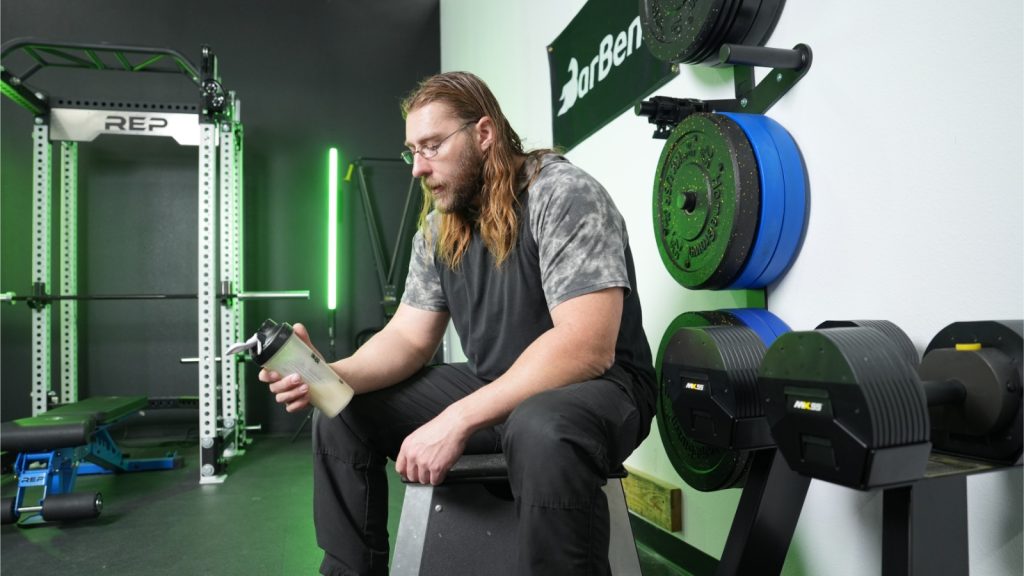
“I like that Optimum Nutrition includes 5 grams of creatine in every serving of their Serious Mass supplement,” says BarBend expert reviewer Chelsea Rae Bourgeois. “For a supplement meant to support weight gain, including creatine helps put on muscle mass. I also like that they kept the formula pretty low in fat. Many mass gainer supplements include a significant amount of saturated fat to boost the calories, and that’s not the case here.”
She scored the formulation a 4 out of 5, specifically shouting out the “impressive vitamin and mineral profile,” which includes vitamins A, B6, B12, C, and E, as well as calcium, iron, and magnesium. That said, she notes that this product is “not for everyone” and “meant for a very specifically targeted demographic.” She adds, “Its macro content is skewed compared to its total calories per serving.”
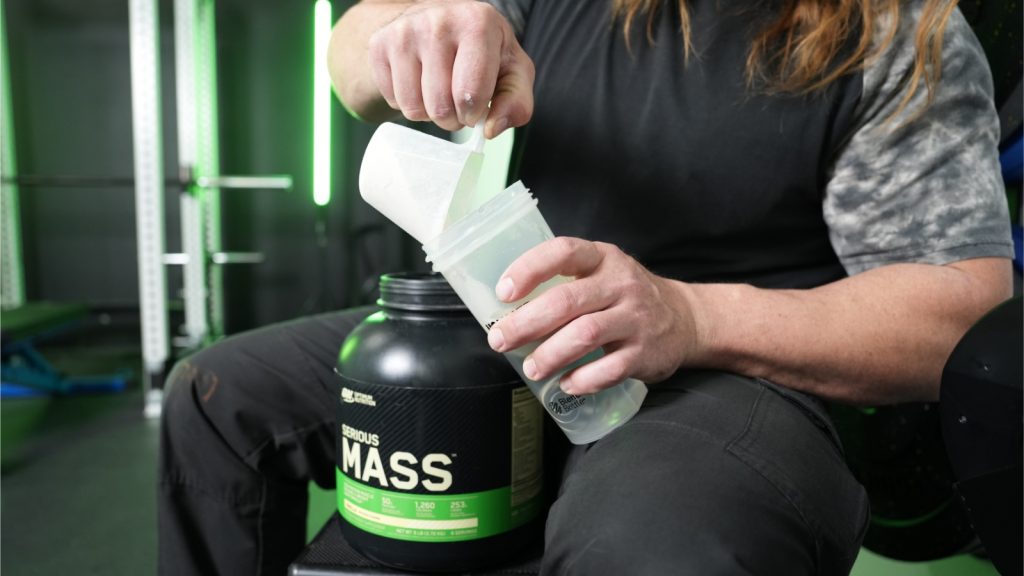
[Related: Best Supplements for Muscle Growth]
Based on our own testing, we graded Serious Mass at a C overall for purity. This protein sample scored in the top 50 percent among all sampled powders for heavy metals, and the top 10 percent for the presence of bisphenols, phthalates, and pesticides.

As far as texture goes, our tester said that it didn’t mix well manually with a spoon or in a blender bottle. Therefore, they recommend blending the product. However, the downside to blending is that it creates a high volume of product that can be hard to consume over the course of a day. They scored it a 4 out of 5 for solubility.
Our tester scored the Vanilla flavor a 3.5 out of 5 for taste. “It tastes like your standard artificial vanilla. Nothing special. It wasn’t too sweet, but I did get sick of it pretty fast.” They experienced a bit of gassiness at first, but that passed relatively quickly.
Read our full Optimum Nutrition Serious Mass Review.
Best Budget Protein Powder for Weight Gain: Muscle Milk Genuine Protein Powder
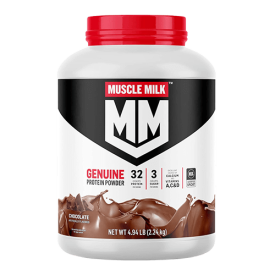
With 32 grams of protein per serving, this impressive protein powder can help you achieve your nutritional goals while serving as a satiating option in-between meals. Additionally, the formulation utilizes whey and casein protein to reap fast-releasing and slow-releasing benefits in one fell swoop.
Specs
- Price Per Serving: $2
- Protein Source: Milk and whey protein blend
- Protein Per Serving: 32g
- Calories Per Serving: 280-290
- Third-Party Testing: Yes (NSF-certified)
- Available Flavors: Chocolate, Cookies ‘n Crème, Strawberries ‘n Crème, Vanilla Crème, Banana Crème
Pros
- Packs more calories and protein than comparably-priced protein powders
- Contains impressive amounts of vitamins A, C, and D
- NSF-certified for sport
Cons
- Contains artificial sweeteners and flavors
- Milk and whey protein blend versus pure protein
- We found the texture a bit grainy and chalky
If you’re looking to put on weight, but overwhelmed by the calorie counts (and prices) of the typical mass gainer, Muscle Milk Genuine Protein Powder can meet you in the middle. For roughly $2 per serving — more than half the cost of the average mass gainer — this protein powder delivers between 280 and 290 calories and 32 grams of protein to assist with hypertrophy.
“Muscle Milk packs 32 grams of protein into each scoop of their Genuine Protein Powder, which I think is pretty remarkable,” says BarBend expert reviewer Chelsea Rae Bourgeois. “But the fact that it includes all nine essential amino acids is even more impressive. I also love that it’s NSF-certified for sport and that it contains impressive amounts of vitamins A, C, and D.”
Based on our own testing, we graded Muscle Milk Genuine Protein Powder at a C overall for purity. This protein sample scored in the top 50 percent among all sampled powders for heavy metals, and the top 10 percent for the presence of bisphenols, phthalates, and pesticides.

Though we like that it’s low in sugar, it does contain 9 grams of fat and 21 grams of carbs. “For those who want to boost their protein intake without skewing their carb and fat intake, this may not be the protein powder for you,” says Bourgeois. It also contains some artificial flavors and additives, which knocked Bourgeois’ formulation score down to a 3.75 out of 5.
Our testers tried the Vanilla Crème flavor and found it mild, but sweet. They added that the two scoops per serving is a lot of powder to dissolve and can produce a grainy and chalky texture. It didn’t clump, though, so there’s that. Our testers scored this product a 3.75 out of 5 for both taste and solubility.
Best Meal Replacement Protein Powder for Weight Gain: Bare Performance Nutrition Strong Food
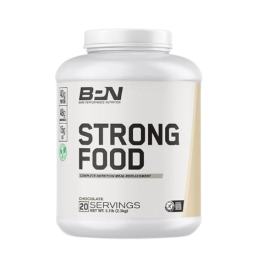
This tasty meal replacement packs 490 calories and 40 grams of protein per serving. It also prioritizes low-glycemic carbs and healthy fats, and has been third-party tested by Informed Sport to verify the purity of its formulation.
Specs
- Price Per Serving: $3.75
- Protein Source: Whey protein isolate and pea protein
- Protein Per Serving: 40g
- Calories Per Serving: 490
- Third-Party Testing: Yes (Informed Sport)
- Available Flavors: Chocolate, Cinnamon Roll
Pros
- High fiber, low-glycemic carbs make this a nutrient-dense meal replacement
- Hefty 40-gram protein serving comes via whey isolate and pea protein blend
- Third-party certified by Informed Sport
Cons
- High in saturated fat
- Sodium intake is on the higher side
- Only two flavor options
Though we always recommend athletes get their macros from whole foods, sometimes that isn’t an option. If you’re in need of one of the best meal replacements to help you stay on track with your weight gain goals, we recommend Bare Performance Nutrition Strong Food, which packs 490 calories and 40 grams of protein into every serving. After testing it personally and researching the list of ingredients, BarBend editorial member Ben Emminger scored the formulation a 4 out of 5.
We also like that it prioritizes low-glycemic carbohydrates via the inclusion of gluten-free oat powder and sweet potato powder. Its healthy fats, meanwhile, come from MCT powder, flaxseed, and macadamia nut oil powder. MCT is a smart addition to a meal replacement, in particular, as research has shown it can help people feel fuller. (14)
That said, each serving does contain 11 grams of saturated fat and 410 milligrams of sodium per serving, which may not be ideal for those on a heart-healthy eating plan.
Emminger scored this product’s taste a 4.5 out of 5, saying, “The Chocolate offering is a nice treat that’s not too sweet or overbearing. I really enjoyed mixing it with milk in a blender for a creamier consistency and flavor profile.”
Solubility scored a 3.5 out of 5. “Each serving calls for three rather large scoops, and finding a blender bottle that can house this much product at once can be a pain,” he said. “I’d recommend investing in a countertop blender if you’d like to consume this powder regularly.”
The Bare Performance Nutrition Strong Food is certified by Informed Sport. This means that it is tested to ensure no banned substances are in this product. This makes it a safe product for athletes and fitness enthusiasts alike. Emminger scored this product a 5 out of 5 for third-party testing.
Best Vegan Protein Powder for Weight Gain: Iron Vegan Athlete’s Gainer
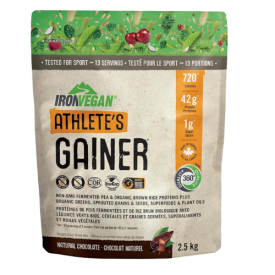
Iron Vegan Athlete’s Gainer contains a potent 720 calories and 42 grams of protein per serving to help support muscle weight gain. And with pea and brown rice proteins providing fiber and vital nutrients, this product is suited for a plant-based diet.
Specs
- Price Per Serving: $3.70
- Protein Source: Pea and brown rice
- Protein Per Serving: 42g
- Calories Per Serving: 720
- Third-Party Testing: Yes
- Available Flavors: Chocolate, Vanilla
Pros
- Informed Choice by Sport certified for banned substances
- Potent calorie content
- Vegan-friendly
Cons
- High sodium content
- Limited flavor options
- Testers not aftertaste from stevia content
Iron Vegan Athlete’s Gainer — among the best vegan protein powders we’ve tested — derives a complete protein profile from fermented pea protein isolate and organic sprouted brown rice protein concentrate, making this a vegan-friendly protein powder for weight gain. Each serving contains 42 grams of non-GMO plant-based protein, 720 calories, and 13 grams of fiber, and is certified vegan, kosher, and gluten-free.
Athlete’s Gainer’s 120 grams of carbs per serving come from healthy, plant-based sources, including organic whole grains (millet, quinoa, amaranth), organic vegetables (kale, spinach), and fruit concentrates like tart cherry, which has been studied for its muscle recovery benefits. (15)
Overall, this supp has a carb-to-protein ratio of 2.85:1. After using this product and researching its list of ingredients, BarBend editorial member Ben Emminger scored the formulation a 4 out of 5.
“There are only two flavors to choose from, and there is a little aftertaste from the stevia leaf extract,” said Emminger. “However, the consistency is pretty nice and I didn’t notice any unpleasant textures in my shake post-mixing. The two scoops of powder are more manageable than other mass gainers, which helps keep this shake more milkshake than concrete.”
He scored taste a 3.5 out of 5 and solubility a 4 out of 5.
[Related: Best Organic Protein Powders]
Emminger was also impressed by Athlete’s Gainer Informed Sport certification, which means Iron Vegan isn’t lying about what’s on the label and that the product contains no banned substances. It received a 5 out of 5 for third-party testing.
Benefits of Protein Powders for Weight Gain
If you’re wondering how to bulk up, the first step is to recalibrate your diet so you’re intentionally consuming more calories than you require. You can’t put on lean body mass without a caloric surplus. Of course, you want to do so in a responsible and strategic way — that means lots of protein and a healthy balance of carbs and fats. Here are some ways protein powders for weight gain can help.
Protein Source
Protein powders for weight gain can help you meet macro goals without having to spend all of your time in the kitchen. Protein powders come in a concentrated form, so you don’t need to consume a big plate of grilled chicken to receive the same amount of protein.
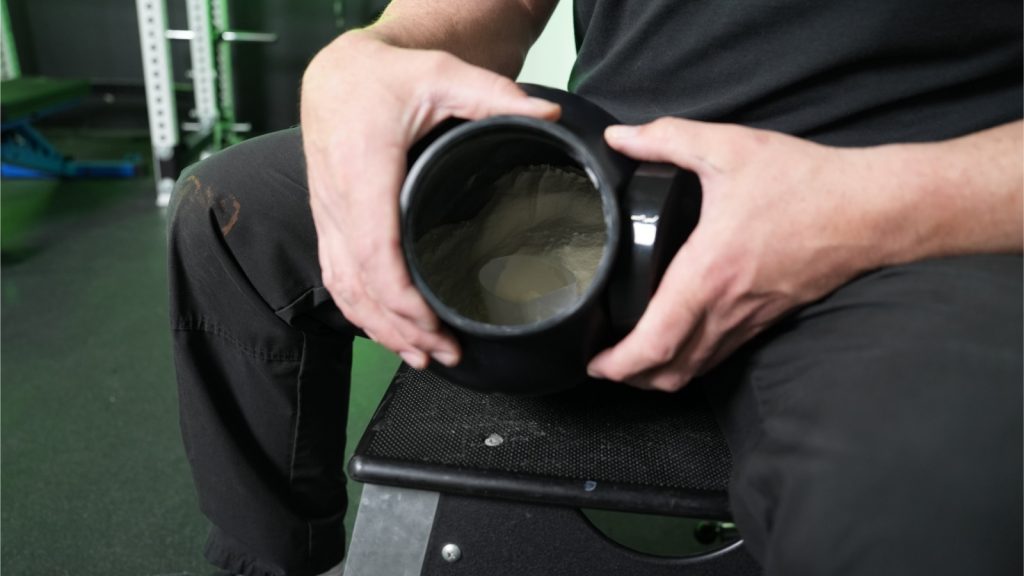
Because of the protein content of such products, you can use this not just for muscle gain, but also to help you meet protein needs daily if you don’t get enough protein from whole foods.
Healthy Carbs
Most protein powders for weight gain contain carbs that are low glycemic, meaning they don’t spike blood sugars (16). These types of healthy carbs — think whole grains, sweet potatoes, and brown rice — also tend to be a good source of fiber, which helps support gut health and overall wellness. (17)
Meal Replacement Option
Because of the high-calorie content you’ll find in protein powders for weight gain, such shakes can replace missed meals. This is especially true of mass gainers, which contain higher doses of macronutrients.
“What mass gainers are really about is putting on weight and maximizing your calorie intake without having to eat a whole meal,” says BarBend expert reviewer Chelsea Rae Bourgeois. We’d just encourage you not to make a habit of it, as the best macros come from whole meals.
What to Consider Before Buying Protein Powders for Weight Gain
Bulking is a delicate dance, and athletes can put on as much fat as muscle if they’re not strategic when it comes to their diet, supplementation, and exercise. Here are some factors to consider when choosing the best protein powder for weight gain.
Protein Powder vs. Mass Gainer
Our list includes both traditional protein powders and mass gainers. The protein powders we’ve selected contain above-average calorie, carb, and protein counts, while the mass gainers have, well, a lot more than average. Before choosing one or the other, consider your fitness goals and just how much of a caloric surplus you need to meet your goals. If you’re unsure, plug your stats into this macros calculator.
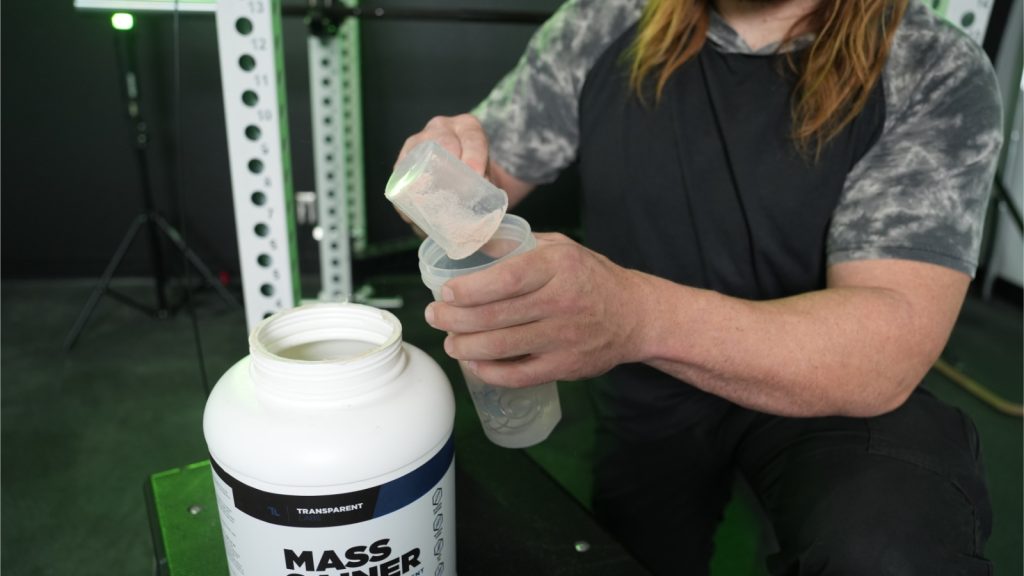
If you’re in a bulking phase or you’re what some call a “hardgainer” (someone who struggles to put on weight), a mass gainer can be useful for helping you consume enough calories, protein, and carbs to help you meet your training and weight-gain goals. If your goals are more casual, you likely don’t need the macro surplus provided by these supplements. It’s not uncommon for those taking a mass gainer to gain unwanted fat in addition to muscle.
“Mass gainers are great to bridge the gap, but try to avoid counting them as meal replacements on the regular,” says BarBend expert reviewer Chelsea Rae Bourgeois. “I would just say go for a well-balanced diet and let these supplements fill the gap as needed.”
Formulation
You’ll want to look at more than just calories and protein when deciding on a protein powder or mass gainer. Mass gainers, in particular, are not suitable for many types of diets. For example, they can often contain high doses of sodium, potassium, and saturated fat, which can be a negative for those adhering to a renal or heart-healthy diet. (18) In general, try to avoid products with more than 300 milligrams of sodium per serving. (19)
Furthermore, since these types of supplements can often be used as meal replacements, you’ll want scoops with quality ingredients and loads of nutrients. That can include micronutrients like iron, magnesium, and A, B, and C vitamins, or even creatine and glutamine that can help you build muscle.
Digestion
Dietary supplements — especially ones so high in calories, carbs, and protein — may cause gastrointestinal distress, bloating, and nausea in some users. We made note of side effects in our testing — and called out any in our reviews — but everybody’s body is different, so you’ll want to take into account your own sensitivities before purchasing.
Some supplements include digestive enzymes to help mitigate these side effects, while other brands include probiotics or gut-healthy ingredients. And while whey protein tends to be the go-to for protein powders, there are a number of plant-based options available to suit not just vegans, but also those with a lactose intolerance.
FAQs: Protein Powders for Weight Gain
What is the best protein powder for weight gain?
The best protein powder for weight gain will contain at least 300 to 500 calories and at least 20 grams of protein per serving. (1)(20) It’s best if these proteins contain all nine essential amino acids for optimal muscle growth support. Our favorite is Transparent Labs Mass Gainer, which exceeds this criteria and includes 3 grams of creatine monohydrate to aid with muscle growth. If you’re not already taking one of the best creatine supplements, that’s a nice bonus.
What are the benefits of taking protein powder to gain weight?
Protein powders for weight gain are convenient and effective. If you’re struggling to get the protein you need to gain weight or you’re coming in below your calorie goals for the day, a simple protein shake can give you a boost at home or on-the-go.
Is whey protein good for weight gain?
Whey protein can support weight loss or weight gain, depending on the application of the product. Research shows that whey protein can be integrated into a weight loss program by providing a portable protein option or meal replacement. (21) However, research also shows that in a higher-calorie form, it can also be used to support muscle gain. (22)
References
- Larson-Meyer, D.E., Krason, R.K. & Meyer, L.M. (2022). Weight Gain Recommendations for Athletes and Military Personnel: a Critical Review of the Evidence. Curr Nutr Rep 11, 225–239.
- Carbone, J. W., & Pasiakos, S. M. (2019). Dietary Protein and Muscle Mass: Translating Science to Application and Health Benefit. Nutrients, 11(5), 1136.
- Helms, E.R., Spence, AJ., Sousa, C. et al. (2023). Effect of Small and Large Energy Surpluses on Strength, Muscle, and Skinfold Thickness in Resistance-Trained Individuals: A Parallel Groups Design. Sports Med – Open 9, 102.
- Nunes, E. A., Colenso-Semple, L., McKellar, S. R., Yau, T., Ali, M. U., Fitzpatrick-Lewis, D., Sherifali, D., Gaudichon, C., Tomé, D., Atherton, P. J., Robles, M. C., Naranjo-Modad, S., Braun, M., Landi, F., & Phillips, S. M. (2022). Systematic review and meta-analysis of protein intake to support muscle mass and function in healthy adults. Journal of cachexia, sarcopenia and muscle, 13(2), 795–810.
- Santos, C. S., & Nascimento, F. E. L. (2019). Isolated branched-chain amino acid intake and muscle protein synthesis in humans: a biochemical review. Einstein (Sao Paulo, Brazil), 17(3), eRB4898.
- Kaspy, M. S., Hannaian, S. J., Bell, Z. W., & Churchward-Venne, T. A. (2023). The effects of branched-chain amino acids on muscle protein synthesis, muscle protein breakdown and associated molecular signaling responses in humans: an update. Nutrition research reviews, 1–14. Advance online publication.
- Wax, B., Kerksick, C. M., Jagim, A. R., Mayo, J. J., Lyons, B. C., & Kreider, R. B. (2021). Creatine for Exercise and Sports Performance, with Recovery Considerations for Healthy Populations. Nutrients, 13(6), 1915.
- Wu, S. H., Chen, K. L., Hsu, C., Chen, H. C., Chen, J. Y., Yu, S. Y., & Shiu, Y. J. (2022). Creatine Supplementation for Muscle Growth: A Scoping Review of Randomized Clinical Trials from 2012 to 2021. Nutrients, 14(6), 1255.
- Wang, Y., Liu, Z., Han, Y., Xu, J., Huang, W., & Li, Z. (2018). Medium Chain Triglycerides enhances exercise endurance through the increased mitochondrial biogenesis and metabolism. PloS one, 13(2), e0191182.
- Trommelen, J., Weijzen, M. E. G., van Kranenburg, J., Ganzevles, R. A., Beelen, M., Verdijk, L.B., van Loon, L. J. C., (2020). Casein Protein Processing Strongly Modulates Post-Prandial Plasma Amino Acid Responses In Vivo in Humans. Nutrients 12;8: 2299.
- Wang, Y, Liu, Z, Han, Y, Xu, J, Huang, W, Li, Z. (2018). Medium Chain Triglycerides enhances exercise endurance through the increased mitochondrial biogenesis and metabolism. PLoS One. 2018 Feb 8;13(2):e0191182.
- Majeed, M, Majeed, S, Nagabhushanam, K, Arumugam, S, Pande, A, Paschapur, M, Ali, F. (2018). Evaluation of the Safety and Efficacy of a Multienzyme Complex in Patients with Functional Dyspepsia: A Randomized, Double-Blind, Placebo-Controlled Study. J Med Food. 2018 Nov;21(11):1120-1128.
- Antonio, J, Street, C. (1999). Glutamine: a potentially useful supplement for athletes. Can J Appl Physiol. 24(1):1-14.
- St-Onge, MP, Mayrsohn, B, O’Keeffe, M, Kissileff, HR, Choudhury, AR, Laferrère, B. (2014). Impact of medium and long chain triglycerides consumption on appetite and food intake in overweight men. Eur J Clin Nutr. 68(10):1134-40.
- Alba, C MA, Daya, M, Franck, C. (2019). Tart Cherries and health: Current knowledge and need for a better understanding of the fate of phytochemicals in the human gastrointestinal tract. Crit Rev Food Sci Nutr. 59(4):626-638.
- Vlachos, D., Malisova, S., Lindberg, F. A., & Karaniki, G. (2020). Glycemic Index (GI) or Glycemic Load (GL) and Dietary Interventions for Optimizing Postprandial Hyperglycemia in Patients with T2 Diabetes: A Review. Nutrients, 12(6), 1561.
- Guan, ZW, Yu, EZ, Feng, Q. (2021). Soluble Dietary Fiber, One of the Most Important Nutrients for the Gut Microbiota. Molecules. 11;26(22):6802.
- Kaur, P., Kumar Yadav, A., Pal, A., Singh Jassal, R., Shafiq, N., Sahni, N., Kumar, V., and Jha, V. (2024) Estimation of dietary intake of sodium, potassium, phosphorus and protein in healthy Indian population and patients with chronic kidney disease. Sec. Clinical Nutrition, Volume 11.
- Ghodeshwar, G. K., Dube, A., & Khobragade, D. (2023). Impact of Lifestyle Modifications on Cardiovascular Health: A Narrative Review. Cureus, 15(7), e42616.
- Deldicque L. Protein Intake and Exercise-Induced Skeletal Muscle Hypertrophy: An Update. Nutrients. 2020; 12(7):2023.
- Batsis, J. A., Petersen, C. L., Cook, S. B., Al-Nimr, R. I., Driesse, T., Pidgeon, D., & Fielding, R. (2021). Impact of whey protein supplementation in a weight-loss intervention in rural dwelling adults: A feasibility study. Clinical nutrition ESPEN 45: 426–432.
- C Sobral, D Gomes, M Silva, P Martins, A Baltazar. (2020). Whey protein supplementation in muscle hypertrophy, European Journal of Public Health. 30:2.